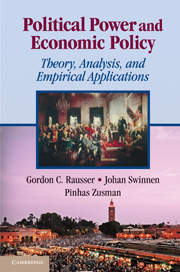Book contents
- Frontmatter
- Contents
- List of Figures
- List of Tables
- Preface
- PART 1 POLITICAL POWER AND ECONOMIC ANALYSIS
- PART 2 IDEOLOGY, PRESCRIPTION, AND POLITICAL POWER COEFFICIENTS
- PART 3 ANALYSIS OF SPECIFIC STRUCTURES
- 10 The Political Economy of Commodity Market Intervention
- 11 The Political Economy of Public Research and Development
- 12 Political-Economic Analysis of Redistributive Policies and Public Good Investments
- 13 Interest Groups, Coalition Breaking, and Productive Policies
- 14 Policy Reform and Compensation
- 15 Political-Economic Analysis of Land Reform
- 16 Political-Economic Analysis of Water Resource Systems
- 17 The Political Economy Lens on Quality and Public Standard Regulations
- 18 Political-Economic Analysis in Transition Economies
- 19 The Power of Bureaucracies: The European Commission and EU Policy Reforms
- PART 4 EMPIRICAL APPLICATIONS OF POLITICAL POWER ESTIMATION
- References
- Index
17 - The Political Economy Lens on Quality and Public Standard Regulations
Published online by Cambridge University Press: 05 June 2012
- Frontmatter
- Contents
- List of Figures
- List of Tables
- Preface
- PART 1 POLITICAL POWER AND ECONOMIC ANALYSIS
- PART 2 IDEOLOGY, PRESCRIPTION, AND POLITICAL POWER COEFFICIENTS
- PART 3 ANALYSIS OF SPECIFIC STRUCTURES
- 10 The Political Economy of Commodity Market Intervention
- 11 The Political Economy of Public Research and Development
- 12 Political-Economic Analysis of Redistributive Policies and Public Good Investments
- 13 Interest Groups, Coalition Breaking, and Productive Policies
- 14 Policy Reform and Compensation
- 15 Political-Economic Analysis of Land Reform
- 16 Political-Economic Analysis of Water Resource Systems
- 17 The Political Economy Lens on Quality and Public Standard Regulations
- 18 Political-Economic Analysis in Transition Economies
- 19 The Power of Bureaucracies: The European Commission and EU Policy Reforms
- PART 4 EMPIRICAL APPLICATIONS OF POLITICAL POWER ESTIMATION
- References
- Index
Summary
Introduction
There exists an extensive theoretical literature on the economics of quality regulation and standards. An important focus of this literature is on the competition and welfare effects of minimum quality standards (Leland 1979; Bockstael 1984). Recent contributions are made by Ronnen (1991), Crampes and Hollander (1995), and Valletti (2000) who use a model of vertical differentiation in quality introduced by Spence (1976), Mussa and Rosen (1978), and Tirole (1988). A related focus is the relation between trade and standards, including various types of standards such as labeling standards (e.g., Fulton and Giannakas 2004; Roe and Sheldon 2007) or environmental standards (e.g., Schleich 1999). Much of this literature evaluates standards as protectionist non-tariff barriers to trade (Barrett 1994; Barrett and Yang 2001; Fischer and Serra 2004; Sturm 2006). Still other studies have argued that standards are not necessarily protectionist instruments (e.g., Tian 2003; Marette and Beghin 2010) and may even enhance trade (Maertens and Swinnen 2009, 2010).
Although this literature investigates the welfare and trade effects of standards, there is little political-economic attention given to the question of how and why (public) standards are selected by governments. Welfare may increase or decrease with the implementation of a public standard, and different groups in society such as consumers and different types of producers may have non-aligned interests. A political power and lobbying perspective provides a lens for understanding how interest groups attempt to influence the government in the implementation of such standards.
- Type
- Chapter
- Information
- Political Power and Economic PolicyTheory, Analysis, and Empirical Applications, pp. 329 - 347Publisher: Cambridge University PressPrint publication year: 2011



